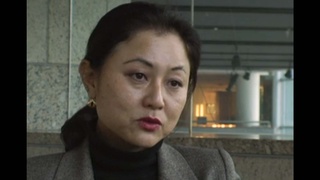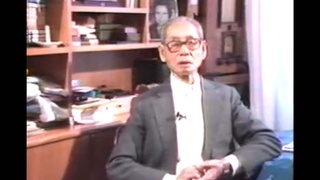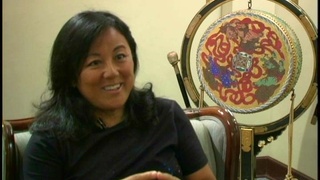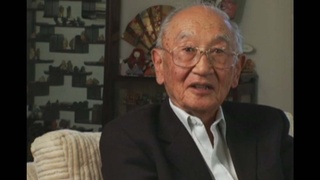Interviews
Arrest of father
Three tall caucasian men were ringing our bell, so I opened the door, the living room, and they almost walked in without my…I just opened door a little but they came in, and they pulled out a…uh, I didn’t know at first what it was…but it was a FBI card.
--And then they said, “Does Seiji Nakahara live here?”
--And, I said, “Oh yeah” but I said, “He’s very sick. He’s sleeping in the back.”
And then, they came right in and went to the bedroom and woke him up and told him put on his bathrobe and slippers and they rushed him right out. I didn’t have time to even ask, “Where are you taking him?” or “What’s this all about?” And so, they took him, and I called my mother who was just down the street at my aunt’s and told my mother, “Come home right away. Somebody just took pop.”
Date: June 16, 2003
Location: California, US
Interviewer: Karen Ishizuka, Akira Boch
Contributed by: Watase Media Arts Center, Japanese American National Museum.
Explore More Videos

A memorable CWRIC testimony of an unjust situation
Judge, only Japanese American to serve on CWRIC.

Being called out of Reserves
(b. 1921) Nisei veteran who served in the occupation of Japan

Fort Snelling
(b. 1921) Nisei veteran who served in the occupation of Japan

Traveling from Manila to Tokyo
(b. 1921) Nisei veteran who served in the occupation of Japan

Camp stories impact on her career
Sansei judge on the Superior Court of Los Angeles County in California

Concentration camp from a Japanese mother’s point of view (Japanese)
Shin-Issei from Gifu. Recently received U.S. citizenship

Fair Play Committee
(1916-2010) draft resister, helped form the Heart Mountain Fair Play Committee

Wanting to take a stand
(1916-2010) draft resister, helped form the Heart Mountain Fair Play Committee

Ostracized by the camp newspapers
(1916-2010) draft resister, helped form the Heart Mountain Fair Play Committee

Arrested in camp for trying to leave
(1916-2010) draft resister, helped form the Heart Mountain Fair Play Committee

Donating clothes to the Japanese interns (Japanese)
(1900–1996) The mother of Nikkei Brazilian immigration

Interrogation by police (Japanese)
(1900–1996) The mother of Nikkei Brazilian immigration

Makegumi - Movement to regognize the defeat of Japan (Japanese)
A central figure for the “Makegumi” (defeatists)

Necessary apologies (Spanish)
(b. 1962) Peruvian Poet, Okinawan descendant

Strictly American, but sympathize with Japan
(1919-2020) Member of the 1800th Engineering Battalion. Promoted Japan-U.S. trade while working for Honda's export division.
